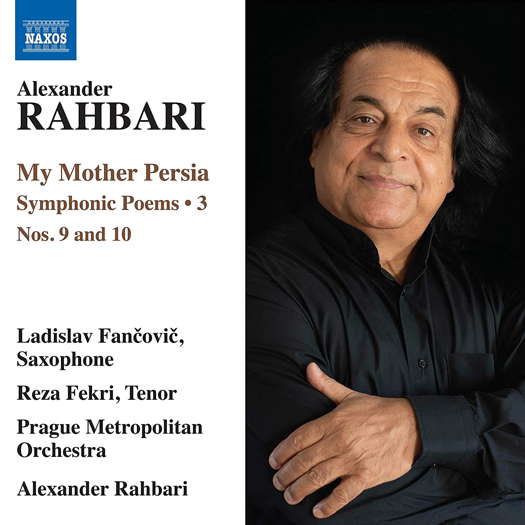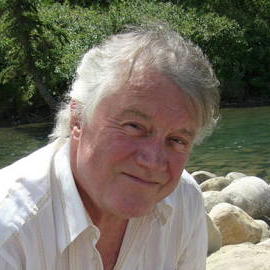- Carl Davis
- Susan Hampton
- Caprice
- Nam June Paik
- Ravel
- Argentinean
- Leif Segerstam
- Karl Amadeus Hartmann

Charming and Evocative
GEOFF PEARCE listens to music by Alexander Rahbari
'The performances by all involved are very fine, and I hope that this will serve to open the ears, minds and heart to music that perhaps, without this fine composer, most of us would never get to hear.'
This is a very interesting CD and well worth the attentions of anyone who wishes to explore unfamiliar music. Alexander Rahbari (born 1948), if familiar at all, is more likely to be known as a conductor. He was mentored at one stage by none other than Herbert von Karajan and was made his assistant in 1980. Whilst Rahbari's compositions are not large in number, he has written consistently since his youth, and Persian traditional music has been a major influence in his life. As a child growing up in Tehran, he had the opportunity to immerse himself in this tradition and study with some of the best.
There are two works on this disc, and they are the last two works in Rahbari's collection of tone poems entitled My Mother Persia.
The first, Symphonic Poem No 9, 'Nohe Khan', was a version of an earlier violin concerto written in 1972, and later arranged in 2018 in this version scored for baritone saxophone and orchestra. The title 'Nohe Khan' is the name given to a singer - usually a tenor - who sings at some religious ceremonies. These singers often perform sad and reflective music and various Persian rhythms are an important component.
The first movement of this work is the longest. It starts with a sad slow melancholic introduction for saxophone alone. It utilises fast tremulous vibrato and then speeds up with repeated patterns of notes that herald the introduction of the orchestra, which enters in a lively dancelike fashion, using Persian rhythmic patterns and melodies that often repeat. This is very colourful and whirling music that builds in excitement, until this subsides in intensity and the saxophone re-enters with brief interjections that interplay with the orchestra.
This is followed by a rather more subdued trombone solo before the whirling woodwind and other brass start building in excitement, until a grand pause is followed by a quieter section where the saxophone is accompanied by solo timpani and sometimes other instruments. This section is somewhat brooding and rhapsodic, with an almost meditative quality. Brass and ominous drum beats are added at times, al most giving a feeling of menace. The variety of textures, different rhythms and short melodies would be the undoing of a lesser composer, but there is coherence to this work and there are constant shifts in mood and texture that entrance me. The writing is fascinating and unusual, full of colour and splashes of light, and it is highly individual. The saxophone indeed plays an important role in the music, and whilst it would be a challenging work to perform, the instrument does not pit itself against the orchestra, is not flashy in any sense of the word, but provides colour and important commentary to the whole work. The final three or so minutes is a coda that rounds off the whole movement, subsiding as if into the distance. The movement reminds me of a religious festival procession with all its colour and movement.
Listen — Alexander Rahbari: Lento - Allegro (Nohe Khan)
(track 1, 2:02-2:52) ℗ 2020 Naxos Rights (Europe) Ltd :
The second movement is relatively short, but with a lot of contrast, flourishes, quieter sections and brassy interjections. It employs many of the rhythmic and melodic elements from the first movement. As the movement progresses, it becomes more and more exultant, interspersed with wailing from the saxophone, as if lamenting.
Listen — Alexander Rahbari: Andante (Nohe Khan)
(track 2, 2:14-3:00) ℗ 2020 Naxos Rights (Europe) Ltd :
The final movement is quick and again there are rhythmic and melodic passages that tie this movement in with the two previous movements. (Indeed I wonder why the work is recorded as three tracks rather than as a single movement, as this is how it comes across to me.) In this final movement, perhaps the saxophone takes more of a solo role than it does in the two previous movements, but it never protrudes too far. Sometimes it has the melodic interest but very often it has an important rhythmic accompanying role. About half way through this movement the music becomes more impassioned and urgent, but this is held in check and it winds down before picking up again, but held back again until the final coda propels the music to a whirling and exultant close.
Listen — Alexander Rahbari: Allegro molto (Nohe Khan)
(track 3, 8:28-9:21) ℗ 2020 Naxos Rights (Europe) Ltd :
The second work on this disc is the Symphonic Poem No 10, 'Morshed' (2019). Rahbari sets a poem by Ferdowsi Tusi (c 940-1020) which implores the reader to get to know and find the creator of this world, at which time all one's fears will be no more. A Morshed is a person of good singing voice who often accompanies various rituals, which often include athletes. The singer synchronises his songs with the movements of the athletes, encouraging their skills. This charming and evocative work has important harp, marimba and other percussion as well as a fine tenor, Reza Fekri, and saxophone.
Listen — Alexander Rahbari: Morshed
(track 4, 7:33-8:20) ℗ 2020 Naxos Rights (Europe) Ltd :
I did not know what to expect when I ordered this disc, and am very pleased that I did. I have not heard anything quite like it. The performances by all involved are very fine, and I hope that this will serve to open the ears, minds and heart to music that perhaps, without this fine composer, most of us would never get to hear.
Copyright © 27 January 2021
Geoff Pearce,
Sydney, Australia

CD INFORMATION - ALEXANDER RAHBARI: MY MOTHER PERSIA 3
MORE CLASSICAL MUSIC ARTICLES ABOUT IRAN




